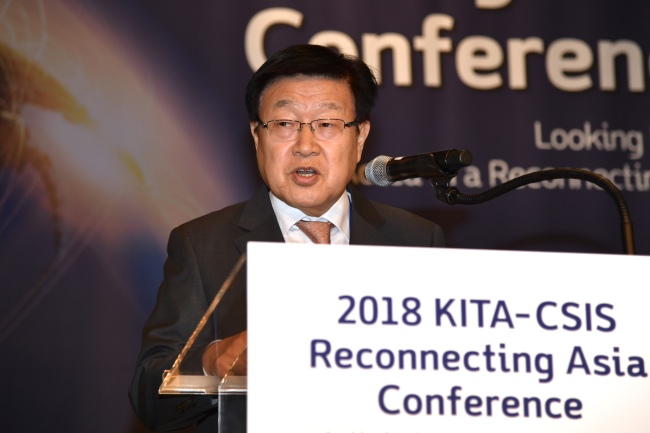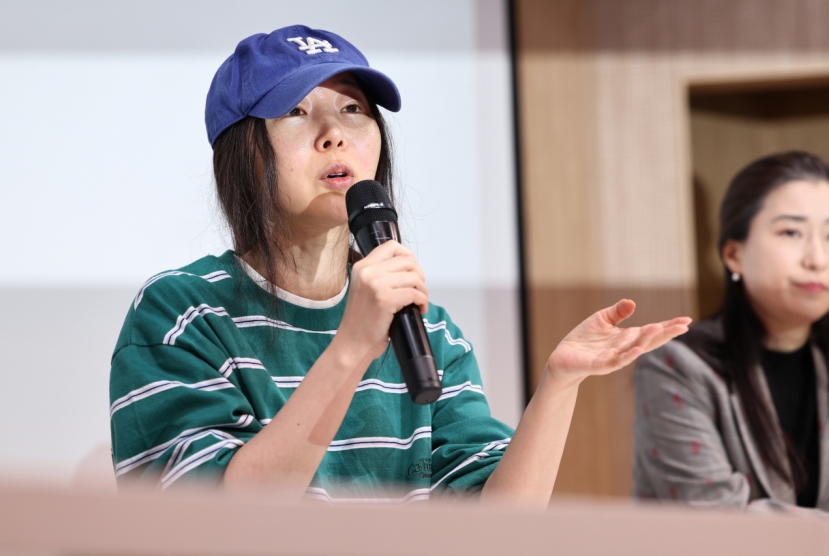Inter-Korean railway will turn S. Korea global logistics hub: experts
By Cho Chung-unPublished : Sept. 18, 2018 - 15:41
South Korea will become a global logistics hub benefitting giants in the industry here if a railway project aimed at reconnecting the South and the North is realized, experts at a forum in Seoul on Tuesday.
“Strained ties between the South and the North have blocked the (international) logistics flow. But if the inter-Korean railway is reconnected all the way to Busan, neighboring countries will enjoy a large convenience in terms of time and costs,” said Na Hee-seung, head of the Korea Railroad Research Institute, at the conference jointly held by the Korea International Trade Association and the Center for Strategic and International Studies.
“Strained ties between the South and the North have blocked the (international) logistics flow. But if the inter-Korean railway is reconnected all the way to Busan, neighboring countries will enjoy a large convenience in terms of time and costs,” said Na Hee-seung, head of the Korea Railroad Research Institute, at the conference jointly held by the Korea International Trade Association and the Center for Strategic and International Studies.

“I expect an immediate agreement (between South and North) as it could make cargo transport, not passenger transport, possible right now,” he said.
If reconnected, Korean companies will seize new business opportunities such as forming joint ventures with foreign firms.
Lee Eun-sun, an official at CJ Logistics, said the company could send products made in the US, for instance, to 64 countries located between Europe and Korea, without having to delivering them by air.
Hyundai Glovis, the logistics arm of Hyundai Motor Group, also said the inter-Korean railway would benefit its international businesses as the railway could be linked with the Trans-Siberian Railway, which as a result would directly connect Korea with Europe.
The range of economic cooperation between Seoul and Pyongyang is limited due to the United Nations’ sanctions on North Korea, but could be expanded only if hurdles are lifted. Businesses should watch closely to monitor progress expected to be made in Pyongyang and cautiously push projects accordingly, said a researcher at CSIS.
Lisa Collins, a fellow researcher at CSIS, also suggested the Seoul government contemplate on how to raise the funds needed for infrastructure building in North Korea and economic cooperation.
Taxpayers could be reluctant to shoulder additional financial burden when the nation is struggling with a stagnant economy. The government should consider raising private funds, not just pubic funds, and seek partnerships with foreign countries like China, she added.
The list of participants included KITA Chairman Kim Young-joo; John Hamre, CEO and president of CSIS; Victor Cha, senior adviser and Korea chair at CSIS; and Reince Priebus, former White House chief of staff for US President Donald Trump.
By Cho Chung-un (christory@heraldcorp.com)



![[Herald Interview] 'Amid aging population, Korea to invite more young professionals from overseas'](http://res.heraldm.com/phpwas/restmb_idxmake.php?idx=644&simg=/content/image/2024/04/24/20240424050844_0.jpg&u=20240424200058)
















